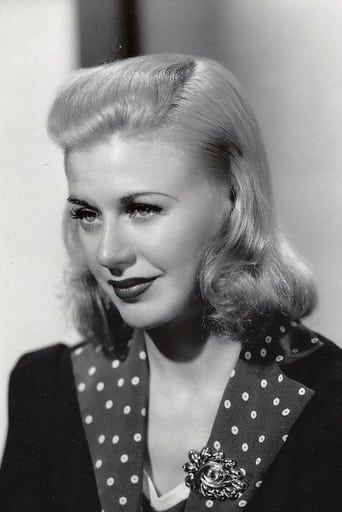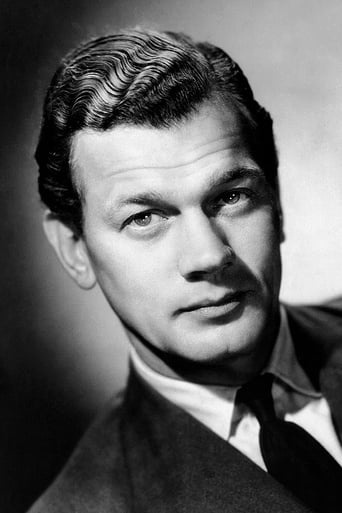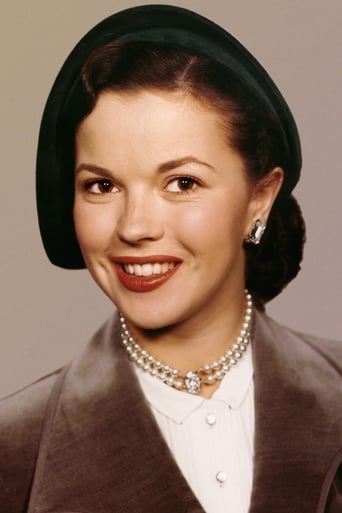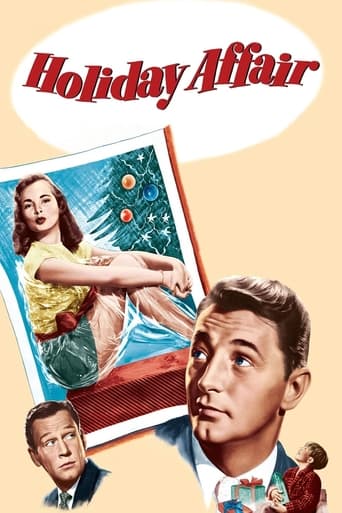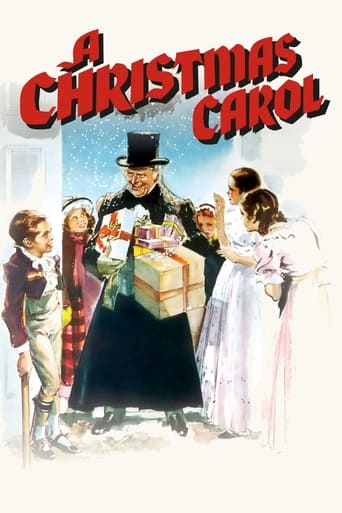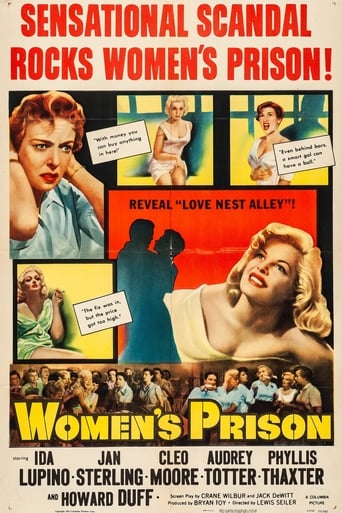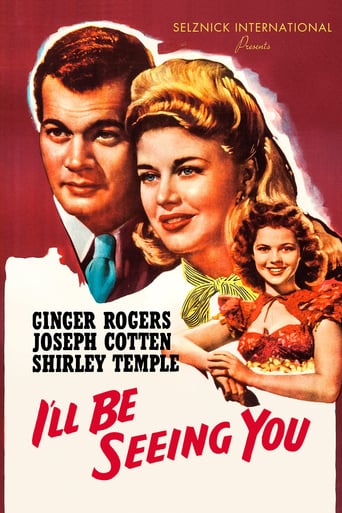
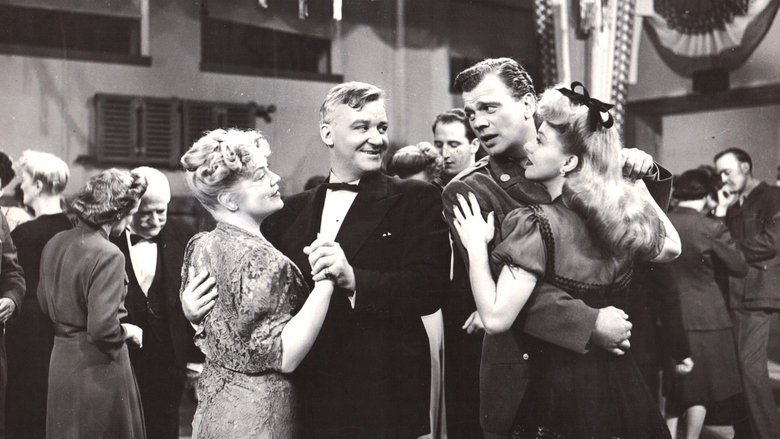
I'll Be Seeing You (1944)
Mary Marshall, serving a six year term for accidental manslaughter, is given a Christmas furlough from prison to visit her closest relatives, her uncle and his family in a small Midwestern town. On the train she meets Zach Morgan, a troubled army sergeant on leave for the holidays from a military hospital. Although his physical wounds have healed, he is suffering from post-traumatic stress disorder and is subject to panic attacks. The pair are attracted to one another and in the warm atmosphere of the Christmas season friendship blossoms into romance, but Mary is reluctant to tell him of her past and that she must shortly return to prison to serve the remainder of her sentence.
Watch Trailer
Cast


Similar titles
Reviews
A pleasant film about two damaged people. Mary Marshall (Ginger Rogers) was jailed for manslaughter and has been given leave to spend time with her aunt and uncle over Christmas.She meets on the train Zachary Morgan (Joseph Cotten) who is having treatment in a military hospital for shell shock. The two get along, exchange details, go for dinner, a movie but are reluctant to tell each other the truth about themselves.We see Zachary getting irritated when he is reminded of his experiences of the war. Meanwhile Mary tells her young cousin that she accidentally killed her boss who tried to seduce her.This is a slightly cliched, melancholic and hokey tale of two lost and rather vulnerable people.
I'll Be Seeing You captures the loneliness of two people who - besides their own serious problems - just don't fit into the bustling wartime image we often see of America in film during that time.The opening scene is in a busy train station. We quickly focus in on two travelers. She (Ginger Rogers as Mary Marshall) is uncomfortable when she tries first to buy a stick of gum and then a chocolate bar and is rebuffed by the sales clerk as though she had been asking to buy gold bullion at a five and dime. He (Joseph Cotten as Zachary Morgan) is uncomfortable because he wants to buy reading material and all that is available is full of news about the war and images that you can tell make him squeamish.Zach is suffering from what would be called PTSD today due to battle fatigue, and he's ashamed of that fact, afraid of winding up like the shell-shocked WWI soldier he knew as a boy.Mary is a convict out on Christmas furlough, although what she is serving time for will probably be a shock to modern sensibilities - I know it was for me. She is also ashamed - understandably perhaps for being a convict, not so understandably for what she did to become one. I'll let you watch the movie and see what I'm talking about here. Against this backdrop of people who feel badly for the positions they are in due to social mores of the 1940's - soldiers are always brave and good girls never get themselves into the position Mary got herself into, these two lonely people find each other and connect. At first Zach lies to Mary about his situation, but then tells her the truth. Mary chooses to keep the truth from Zach, partly because she loves him and doesn't want to lose him, but mainly because her company is making him well - he says her self-confidence is giving him confidence - and she doesn't want to set back his recovery.Mary is staying with her aunt, uncle, and cousin during the holidays, and this warm family setting has both of them healing just a bit. Shirley Temple plays the cousin that is too young to know why Mary is in prison or wear lipstick according to her parents, but is apparently old enough to go out unchaperoned with a Lieutenant on leave who is probably five years older than she! Spring Byington plays the aunt who is supportive overall but still drops phrases from time to time that leave you wondering about the overall wisdom of her advise. For example, she keeps telling Mary to settle for second best and pretend it's first best - that's what she did!. Rather wacky advice by today's standards, but maybe mainstream feelings for people who married during the roaring twenties, and then raised a family during the depression and world war. I highly recommend this sentimental favorite of mine. I'm rather surprised it hasn't become more of a Christmas standard, because even though in many ways it is a unique snapshot in time, the story of two lonely people finding each other in a world that would probably judge them severely if they were open about their problems is universal.
There's nothing I can say....usual sentimental torture...Gosh I love this stuff! Some will find it a bit old-fashioned in timing and plot. I'm maybe old-fashioned myself, but I think the story is very beautiful. Ginger Rogers is (she's one of my favorites!) really good, a very underrated actress of that time...she could do anything and do it fine, with class and elegance. A real dramatic performer. Haven't seen Cotten before, he's a fine actor too! I like his reflective way of acting, the postures he takes when the voice comes in his head, which is a good idea of the director I guess...very effective, drags you into the character's inner feelings. They make a fine couple! But the real surprise is a grown Shirley Temple, whom can carry herself very well in drama too, a bit too exaggerate in the gestures, sometimes too simpering, after all she's an adolescent, but very good indeed! In the end I highly recommend this movie to everyone who hasn't seen it yet. For me (remember, I'm old-fashioned) rating is 10/10!
The other users have described the plot so no further comment is necessary therefore I will restrict myself to the acting and character portrayals.This film was produced in the same year that "Since You Went Away" was released by Selznick and contains two actors in that film, Shirley Temple and Joseph Cotton.It certainly did not have the same budget or production values as the aforesaid film, so I could only award it 6/10 as it is a rather straightforward "romcom".Todays liberal 2009 UK/(US?) courts would probably have given Ginger Rogers' character Mary an absolute discharge where she had no previous convictions and where the prosecution and defence teams agree that no useful purpose would be served to society giving the accused defendant a custodial sentence.However in 1944 the justice system was more severe and literal.To show Ginger Rogers could do straight dramatic roles look no further than "Kitty Foyle" (1940) for which she won her best actress "Oscar".Ginger was 33 when she acted this role so was a little mature but William Dieterle gave her soft focus lens close-ups and a youthful dress to take a few years off her age.This was the first time I had seen this film which is surprising as I thought I knew most popular 1940s films, it certainly has not been seen on UK TV network stations to my knowledge.After having seen Hitchcock's acclaimed "Shadow of a Doubt" (1943),I was preparing myself for Joseph Cotton to perform another "Uncle Charlie" role especially as he appeared to have suffered psychiatric medical problems.However this suspicion was allayed early on and "Zach" became more normal as the film progressed.One thing puzzled me. How did Zach know which prison to wait for Mary and when she would be returning there especially as she and her relatives had not given him its address.The ending was rather sappy but presumably done to cheer up war time audiences.Also I do wish directors would insist on actors carrying a full suitcase as an empty one is obvious when someone attempts to pick it up, i.e. Mary's initial arrival at her Aunt & Uncle's house.This fault in leaving home scenes still persists in todays soaps/films, despite cinema verite.


